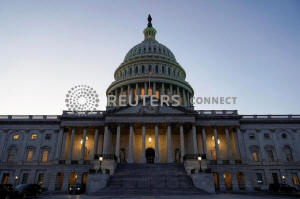U.S. governors question cost of Trump COVID-19 aid plans, urge talks to
continue
 Send a link to a friend
Send a link to a friend
 [August 11, 2020]
By Patricia Zengerle and David Morgan [August 11, 2020]
By Patricia Zengerle and David Morgan
WASHINGTON (Reuters) - Republican and
Democratic governors said on Monday President Donald Trump's coronavirus
relief measures were too expensive for states to implement as they
struggle with the costs of the pandemic, and called on officials in
Washington to resume negotiations on federal aid.
"We are concerned about the significant administrative burdens and costs
this latest action would place on the states," the leaders of the
National Governors Association said in a statement.
"The best way forward is for the Congress and the Administration to get
back to the negotiating table and come up with a workable solution,
which should provide meaningful additional relief for American
families," New York's Democratic governor, Andrew Cuomo, and Arkansas'
Republican governor, Asa Hutchinson, said.
Talks on a new coronavirus relief package between top Trump
administration officials and congressional Democratic leaders collapsed
on Friday without an agreement and the two sides have not been in touch
since. The Democratic-led House of Representatives passed a $3.4
trillion aid bill in May.

In a bid to move ahead without Congress, the Republican president on
Saturday signed executive orders and a memorandum seeking to provide
relief to workers, businesses and local governments.
Eviction protections and enhanced unemployment assistance both expired
in July, slashing aid for more than 30 million people.
Trump's orders addressed payroll taxes, evictions and student loan
payments, and included a plan to provide supplemental unemployment
benefits using disaster relief funds. States would be required to cover
25% of the unemployment funding under the plan.It was not immediately
clear that Trump's orders would have any significant impact on the
crisis, however.
U.S. states have seen sharp declines in taxes and other revenues and
steep demands for services from residents during the crisis.
California Governor Gavin Newsom, a Democrat, said Trump's plan would
cost his state $700 million per week, which it could not provide without
cutting other important services.
[to top of second column]
|

Lights shine from the U.S. Capitol dome prior to a vote in the U.S.
House of Representatives on two articles of impeachment against U.S.
President Donald Trump in Washington, U.S., December 18, 2019.
REUTERS/Joshua Roberts

PARTISAN POLITICS
Republican Senate Majority Leader Mitch McConnell, who did not join
the negotiations, accused Democrats of stalling aid to secure
objectives like $1 trillion for state and local governments, which
he dismissed as a bailout for "mismanaged" Democratic-led states.
The Senate unveiled its $1 trillion package late last month, around
when administration officials began negotiating with the Democrats.
"(Democrats are) willing to personally increase the pain for
vulnerable families unless they get their way," McConnell said as
the Senate opened on Monday.
Senate Democratic Leader Chuck Schumer, who has led negotiations
alongside House Speaker Nancy Pelosi, said Democrats would talk if
Republicans would compromise.
"Democrats remain ready to return to the table. We need Republicans
to join us there and meet us halfway," he said.
Treasury Secretary Steven Mnuchin, who has represented the White
House in the talks, said he had not spoken to Pelosi or Schumer
since Friday but was willing to meet.
"We're prepared to put more money on the table," he told reporters
at the White House. He insisted most states would be able to execute
Trump's unemployment order within a week or two.
There are areas of agreement between Democrats and Republicans,
including providing money for schools and coronavirus testing. But
they remain at odds over major issues like the level of unemployment
benefits and liability protections for businesses.
The expired federal benefit was $600 per week on top of state
unemployment payments. Trump proposed $400.
(Reporting by Susan Cornwell, David Morgan and Patricia Zengerle;
Additional reporting by Susan Heavey and David Lawder, writing by
Patricia Zengerle; Editing by Andy Sullivan, Alistair Bell and Sonya
Hepinstall)
[© 2020 Thomson Reuters. All rights
reserved.] Copyright 2020 Reuters. All rights reserved. This material may not be published,
broadcast, rewritten or redistributed.
Thompson Reuters is solely responsible for this content. |